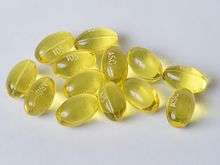Benzonatate
Benzonatate, sold under the brand names Tessalon among others, is a medication used to try to help with the symptom of cough and hiccups.[1][2] It is taken by mouth.[1] Use is not recommended in those under the age of 10.[3] Effects generally begin within 20 minutes and last up to eight hours.[1]
 | |
| Clinical data | |
|---|---|
| Trade names | Tessalon, Zonatuss, others |
| AHFS/Drugs.com | Monograph |
| MedlinePlus | a682640 |
| Pregnancy category |
|
| Routes of administration | By mouth |
| ATC code | |
| Pharmacokinetic data | |
| Elimination half-life | 3-8 hours |
| Identifiers | |
IUPAC name
| |
| CAS Number | |
| PubChem CID | |
| IUPHAR/BPS | |
| DrugBank | |
| ChemSpider | |
| UNII | |
| KEGG | |
| ChEBI | |
| ChEMBL | |
| CompTox Dashboard (EPA) | |
| ECHA InfoCard | 100.002.904 |
| Chemical and physical data | |
| Formula | C30H53NO11 |
| Molar mass | 603.742 g/mol g·mol−1 |
| 3D model (JSmol) | |
SMILES
| |
InChI
| |
| | |
Side effects include sleepiness, headache, hallucinations, bronchospasm, and dizziness.[1] Excessive doses may cause seizures or an irregular heartbeat.[3] It is unclear if use in pregnancy and breastfeeding is safe.[4] It works by numbing stretch receptors in the lungs.[1]
Benzonatate was approved for medical use in the United States in 1958.[1] It is available as a generic medication.[3] In the United States the wholesale cost of is about 0.12 USD per dose.[5] It is not available in many countries.[6] In 2016 it was the 193rd most prescribed medication in the United States with more than 3 million prescriptions.[7]
Medical uses
Benzonatate is used to try to reduce coughing in various respiratory conditions such as bronchitis, emphysema, influenza, and pneumonia.[8] Evidence to support its use is poor as of 2015.[6][9]
It has been used in small doses as a topical anesthetic for mouth or pharyngeal pain. This practice is not recommended, because the oropharyngeal anesthesia may result in pulmonary aspiration.[10]
Adverse effects
Benzonatate can cause nausea, headache, sedation, a feeling of numbness in the chest, mental confusion, and visual hallucinations. The liquid-filled capsules resemble candy, which may attract children. Excessive absorption of benzonatate will occur if the gelcaps are chewed or allowed to dissolve in the mouth. This may lead to an overdose of the drug. [11] Ingestion of an excessive dose can cause laryngospasm, bronchospasm, seizures, cardiac arrhythmia, and circulatory collapse. Ingestion of a small handful of capsules has caused seizures, cardiac arrhythmias, and death in adults. Chewing or sucking of a single capsule can cause death of a small child.[12][13]
Para-aminobenzoic acid (PABA) is a metabolite of drugs in the ester class of local anesthetics, which includes benzonatate, procaine and tetracaine. Severe allergic reactions have been reported in patients who are allergic to PABA. Severe sensitivity reactions to benzonatate have resulted in respiratory side effects such as bronchospasm, laryngospasm, and cardiac arrest.[14]
Excessive absorption of benzonatate (a local anesthetic) in the oral mucosa will result in the rapid development of numbness of the mouth and throat. In extreme cases, the mouth and pharynx may become so numb that pulmonary aspiration may occur.
Mechanisms of action
Benzonatate acts as a local anesthetic, decreasing the sensitivity of stretch receptors in the lower airway and lung, thereby reducing the drive to cough after taking a deep breath.[15][8]
Chemical structure
Benzonatate is a butylamine, structurally related to other polyglycol ester local anesthetics such as procaine and tetracaine.
Dosage and administration

Benzonatate is sold as yellow or blue 100 mg and 200 mg softgel capsules. Initial dose is one 100 mg perle (gelcap) by mouth, 3 times a day. Dosage may be increased as necessary, up to a maximum of 600 mg per day.[16]
Due to its potency and potential toxicity, the capsules must be swallowed intact in order to allow slower release of the medication.
References
- "Benzonatate Monograph for Professionals". Drugs.com. American Society of Health-System Pharmacists. Retrieved 23 March 2019.
- Becker, DE (2010). "Nausea, vomiting, and hiccups: a review of mechanisms and treatment". Anesthesia Progress. 57 (4): 150–6, quiz 157. doi:10.2344/0003-3006-57.4.150. PMC 3006663. PMID 21174569.
- "Drugs for cough". The Medical Letter on Drugs and Therapeutics. 60 (1562): 206–208. 17 December 2018. PMID 30625123.
- "Benzonatate Use During Pregnancy". Drugs.com. Retrieved 3 March 2019.
- "NADAC as of 2019-02-27". Centers for Medicare and Medicaid Services. Retrieved 3 March 2019.
- Walsh, T. Declan; Caraceni, Augusto T.; Fainsinger, Robin; Foley, Kathleen M.; Glare, Paul; Goh, Cynthia; Lloyd-Williams, Mari; Olarte, Juan Nunez; Radbruch, Lukas (2008). Palliative Medicine E-Book. Elsevier Health Sciences. p. 751. ISBN 9781437721942.
- "The Top 300 of 2019". clincalc.com. Retrieved 22 December 2018.
- Medicalook.com: Benzonatate
- Bruera, Eduardo; Higginson, Irene; Gunten, Charles F. von; Morita, Tatsuya (2015). Textbook of Palliative Medicine and Supportive Care. CRC Press. p. 677. ISBN 9781444135268.
- Medline Plus: Benzonatate
- Cohan, J. A.; Manning, T. J.; Lukash, L.; Long, C.; Ziminski, K. R.; Conradi, S. E. (1986). "Two fatalities resulting from Tessalon (benzonatate)". Veterinary and Human Toxicology. 28 (6): 543–544. PMID 3788039.
- Bishop-Freeman SC, Shonsey EM, Friederich LW, Beuhler MC, Winecker RE (June 2017). "Benzonatate Toxicity: Nothing to Cough At". J Anal Toxicol. 41 (5): 461–463. doi:10.1093/jat/bkx021. PMID 28334901.
- "Benzonatate".
- Crouch, B. I.; Knick, K. A.; Crouch, D. J.; Matsumura, K. S.; Rollins, D. E. (1998). "Benzonatate overdose associated with seizures and arrhythmias". Journal of Toxicology. Clinical Toxicology. 36 (7): 713–718. doi:10.3109/15563659809162620. PMID 9865240.
- "Drugs for cough". Med Lett Drugs Ther. 60 (1562): 206–208. December 2018. PMID 30625123.
- MedicineNet.com: Benzonatate